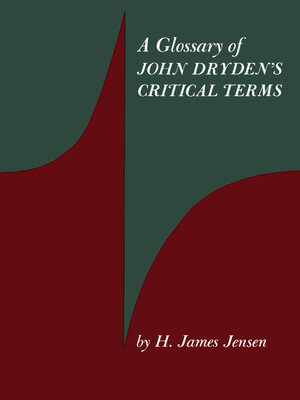
Sign up to save your library
With an OverDrive account, you can save your favorite libraries for at-a-glance information about availability. Find out more about OverDrive accounts.
Find this title in Libby, the library reading app by OverDrive.



Search for a digital library with this title
Title found at these libraries:
| Library Name | Distance |
|---|---|
| Loading... |
A Glossary of John Dryden's Critical Terms was first published in 1969. Minnesota Archive Editions uses digital technology to make long-unavailable books once again accessible, and are published unaltered from the original University of Minnesota Press editions.
Although John Dryden is, as Samuel Johnson described him, the father of modern criticism, his critical writings are difficult for twentieth-century readers to understand and appreciate. Part of the problem lies in the fact that many of the critical terms which Dryden used have changed or expanded in meaning since his time. By providing a series of glosses of seventeenth-century critical terms, this volume clarifies and illuminates Dryden's work for modern readers and scholars.
Professor Jensen has catalogued every important word that Dryden used in discussing critical matters, whether about art, literature, or music. In addition to covering all of Dryden's works, the glossary encompasses works of other important seventeenth century critics, among them, John Milton, Ben Johnson, and Thomas Rymer.
The structure of the glossary is simple: under each word there is a general definition and, if needed, an essay on the word's origin, history, and general usage. Then the various particular meanings of the word are given, and under each definition are listed the critics, the works, the editions, and the page numbers where the word is used with that particular meaning. Selected quotations abound, substantiating the text.
The book will be useful for students and teachers in seventeenth and eighteenth-century literature courses and for scholars doing advanced research. Students will gain an understanding of the development of critical though by reading the essays in the Glossary. Modern scholars of Restoration literature will find new ideas here as well as confirmation of some older conjectures about Dryden.







